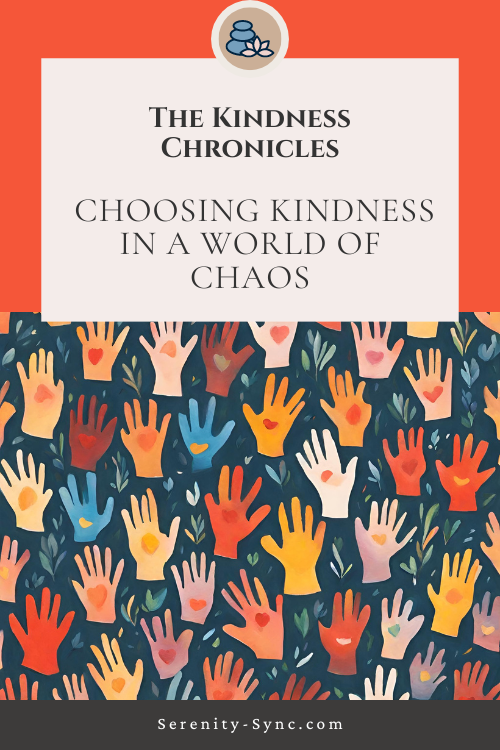In Brief
In a world filled with violence and negativity, choosing kindness is more important than ever. Kindness, defined as being friendly, generous, and considerate, has the power to bring happiness, improve health, and make a positive difference in the world. This article explores the challenges of choosing kindness, the benefits it offers, and practical tips for incorporating kindness into everyday life. By spreading love and compassion, kindness has the potential to create a more harmonious and compassionate society.

Your Free PDF version of this blog post Awaits – No Strings, Just Click and Enjoy! 🌸🎁
Introduction: A World in Turmoil
In today’s society, it is evident that there is a desperate need for kindness. Violence and hatred seem to dominate the headlines, leaving many feeling hopeless and discouraged. However, it is precisely during times of chaos that choosing kindness becomes even more crucial. Kindness has the power to break through the darkness and bring light and hope to individuals and communities.
Fun Fact
Kindness knows no boundaries, not even species! Animals also exhibit acts of kindness towards one another. From dolphins saving humans from shark attacks to elephants comforting distressed herd members, the animal kingdom is full of heartwarming examples of kindness in action. It’s a reminder that kindness truly is a universal language.
The Definition of Kindness
Kindness can be defined in various ways, but at its core, it means being friendly, generous, and considerate towards others. Being friendly involves simple acts of reaching out, smiling, and engaging in conversation. These small acts can have a significant impact on someone’s day and can even turn a bad day into a good one. Being generous goes beyond material possessions; it means sharing our time, skills, and resources with others. By uplifting those around us, we create a positive ripple effect that can transform lives. Being considerate means showing empathy and understanding towards others. It involves being mindful of our words and actions, taking into account the feelings and needs of those around us.
The Challenges of Choosing Kindness
While kindness may seem like a simple concept, it can be challenging to put into practice. As humans, we have a natural inclination towards negativity. Our brains are wired to pay more attention to threats and dangers, which can make it difficult to choose kindness in the face of adversity. Additionally, we often hold biases and flawed thinking patterns that can hinder our ability to be truly kind. Overcoming these challenges requires a conscious effort to change our actions and mindset.
Natural inclination towards negativity
Our brains are wired to focus on negativity, as it was essential for our survival in the past. However, in today’s world, this negativity bias can prevent us from seeing the good in others and choosing kindness. By recognizing this bias and consciously redirecting our attention towards positive behavior, we can overcome this challenge.
Overcoming biases and flawed human thinking
Biases are unconscious preferences or prejudices that influence our thoughts and actions. These biases can prevent us from being truly kind and compassionate towards certain individuals or groups. Overcoming biases requires self-reflection, education, and a willingness to challenge our own beliefs. By recognizing and addressing our biases, we can open ourselves up to a more inclusive and kinder mindset.
Tips for changing actions and mindset to choose kindness
Changing our actions and mindset to choose kindness requires intentional effort. Here are some practical tips to help incorporate kindness into everyday life:
- Practice empathy: Put yourself in others’ shoes and try to understand their perspective.
- Be mindful of your words: Choose words that uplift and encourage others rather than tearing them down.
- Perform random acts of kindness: Small gestures like holding the door for someone or complimenting a stranger can have a big impact.
- Volunteer your time: Find opportunities to give back to your community and help those in need.
- Choose forgiveness: Let go of grudges and choose to forgive others, even when it’s difficult.
The Benefits of Choosing Kindness
Choosing kindness not only benefits those around us but also has a profound impact on our own well-being.
Increased happiness: The science behind kindness
Multiple studies have shown that acts of kindness release happiness chemicals in the brain, such as dopamine and oxytocin. These chemicals not only boost our mood but also create a sense of fulfillment and satisfaction. By choosing kindness, we can experience greater happiness in our own lives.
Improved health: Reducing stress and promoting well-being
Kindness has been linked to improved mental health and reduced stress levels. When we practice kindness, our bodies release stress hormone cortisol, helping us feel more relaxed and at ease. Additionally, acts of kindness have been shown to boost our immune system, allowing us to stay healthier and more resilient.
Making a positive difference: The ripple effect of kindness
Kindness has the power to create a positive ripple effect in the world. When we choose kindness, it inspires and encourages others to do the same. This ripple effect can lead to a more compassionate and harmonious society, where love for humanity prevails.
Fun Fact
Did you know that being kind can actually boost your immune system? Studies have shown that acts of kindness release endorphins, which can strengthen your body’s natural defenses. So, next time you’re feeling under the weather, a little kindness might just be the best medicine!
Kindness as a Way to Make a Difference
Kindness has the power to impact others in profound ways. When we choose to be kind, we inspire kindness and compassion in others. Acts of kindness create a ripple effect, spreading love and positivity throughout communities. It’s like a domino effect, where one act of kindness leads to another, making the world a better place. Kindness has the potential to build a more compassionate world, serving as a catalyst for change. By choosing kindness, we can inspire others to do the same and create a chain reaction of positivity.
Impacting others: Inspiring kindness and compassion
When we choose kindness, we have the power to impact the lives of others in significant ways. Simple acts of kindness, such as offering a helping hand or a kind word, can brighten someone’s day and make them feel seen and valued. These acts of kindness not only benefit the recipient but also have a positive impact on the person performing the act. Kindness has the ability to fulfill our innate need for connection and belonging, boosting our happiness and well-being.
Research has shown that witnessing acts of kindness releases oxytocin, also known as the “love hormone,” in our brains. This not only makes us feel good but also inspires us to be kinder ourselves. It’s like a contagious cycle of kindness, where one act inspires another, creating a ripple effect of positivity. By choosing kindness, we can inspire others to do the same, making the world a better and more compassionate place.
Creating a ripple effect: Spreading love and positivity
Kindness has the power to create a ripple effect, spreading love and positivity throughout communities. When we choose to be kind, our actions inspire others to follow suit. It’s like a wave of kindness that starts small but gains momentum as more people join in. Each act of kindness has the potential to touch multiple lives, creating a chain reaction of positivity.
Acts of kindness can be as simple as paying for someone’s coffee, helping a stranger with their groceries, or offering a listening ear to a friend in need. These small gestures may seem insignificant, but they have the power to make a big difference in someone’s day. By spreading love and positivity through acts of kindness, we contribute to a more harmonious and compassionate society.
Building a compassionate world: Kindness as a catalyst for change
Kindness serves as a catalyst for change, building a more compassionate world. When we choose to be kind, we challenge the status quo and break down barriers. Kindness has the power to bridge divides, whether they be cultural, social, or ideological. It allows us to see past our differences and connect on a human level, fostering understanding and empathy.
By choosing kindness, we can contribute to resolving conflicts, promoting positive behavior, and making the world a better place. It starts with small acts of kindness in our everyday lives, but the impact can be far-reaching. Kindness has the power to create a ripple effect that extends beyond our immediate surroundings, inspiring others to choose kindness and creating a more compassionate and harmonious world.
Choosing Kindness in Everyday Life
Kindness should not be reserved for special occasions or random acts. It should be a way of life, integrated into our everyday interactions and choices. By choosing kindness in various aspects of our lives, we can foster stronger relationships, promote positivity in the workplace, and contribute to our communities.
Kindness at home: Strengthening relationships with loved ones
Kindness begins at home, where our actions and words have the most significant impact. By choosing kindness in our interactions with loved ones, we can strengthen our relationships and create a loving and supportive environment. Simple acts of kindness, such as expressing gratitude, offering a helping hand, or actively listening, can go a long way in nurturing meaningful connections.
When we choose kindness at home, we create a safe space where love, respect, and understanding thrive. It’s about being considerate of each other’s needs, supporting one another’s goals and dreams, and practicing forgiveness and empathy. Kindness not only enhances our relationships but also allows us to experience inner peace and a kind spirit.
Kindness at work: Fostering a positive and supportive environment
Kindness is not limited to our personal lives; it also has a place in the workplace. By choosing kindness at work, we can foster a positive and supportive environment that benefits everyone. Simple acts of kindness, such as offering a compliment or providing assistance to a colleague in need, can boost morale, enhance teamwork, and improve overall job satisfaction.
Kindness in the workplace also involves treating others with respect and empathy, resolving conflicts in a constructive manner, and celebrating each other’s successes. When we choose kindness at work, we create an atmosphere of inclusivity and cooperation, where individuals feel valued and supported. This can lead to increased productivity, improved mental health, and a more fulfilling work experience for all.
Kindness in the community: Engaging in acts of service and volunteering
Kindness extends beyond our immediate circles; it extends to our communities. By choosing kindness in our communities, we can make a positive impact and contribute to making the world a better place. Engaging in acts of service and volunteering allows us to give back and support those in need.
Acts of kindness in the community can involve volunteering at local charities or organizations, participating in community clean-up efforts, or simply lending a helping hand to a neighbor in need. By actively engaging in acts of kindness in our communities, we not only make a difference in the lives of others but also experience a sense of fulfillment and purpose.
Conclusion: The Power of Choosing Kindness
Choosing kindness is a powerful tool that can transform our lives and the world around us. It may not always be easy, but the benefits are undeniable. By embracing kindness in our actions and interactions, we can create a more compassionate and harmonious society. So, let’s make a conscious choice to be kind, and let the ripples of our kindness spread far and wide. Together, we can make the world a better place, one act of kindness at a time.
Fun Fact
Kindness is contagious, quite literally! Research has found that when we witness acts of kindness, our brains release oxytocin, also known as the “love hormone.” This not only makes us feel good but also inspires us to be kinder ourselves. Spread the love, and watch it multiply!

